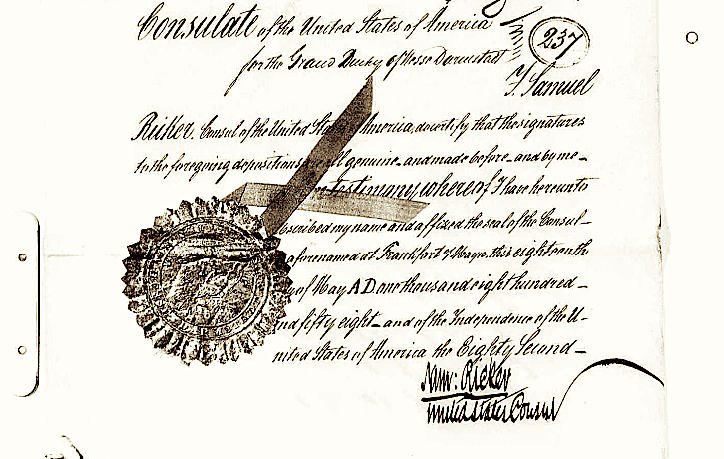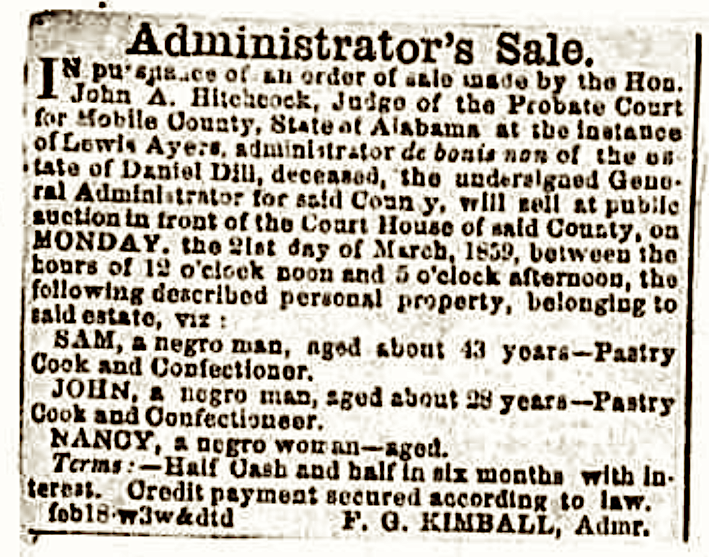Daniel’s former clerk, Lewis Ayers, took control of Daniel’s estate on March 27, 1858. He had his work cut out for him: he had to gather up an inventory of the estate; wait for a hearing to determine whether Edwin Gould owed money to the estate for mismanagement; then sell all the assets and distribute the proceeds to the heirs.
Edwin Gould, meanwhile, was in somewhat of a panic1. On April 2, he penned a letter [ref 1346] to his former clerk, George Rode, who had returned to his home near Frankfurt – it was actually “Gross Steinheim near Hanau in the Grand Duchy of Hesse Darmstadt” [ref 1334] He told Rode to expect some interrogatories, and that he should respond to them in his own handwriting, if possible.
My object is to establish by you that I performed for Mr. Dill in his life time, valuable services worthy of compensation for a period of 5 years, and the object of my opponents is to show that my services were in fact nothing, but mere acts of personal friendship, and that I never expected compensation and do not merit any. As you know the intercourse between Mr. Dill and myself for about 4 years, better than anybody else, because you were in my employ and saw all that was going on, and talked with Mr. Dill often and heard what he said, and all that he promised, I want your evidence. [ref 1346]
I think Mr. Rode got a little freaked out by all this. Copies of the interrogatory questions are in the probate file [ref 1349-1355]. There were 22 questions from Gould’s attorney and 11 questions from Ayer’s attorney (the same attorney who had helped Peter). Mr. Rode took the interrogatories to the U.S. Consulate and it appears that a clerk transcribed his answers. Both a consulate commissioner and Mr. Rode signed each and every page. The last page has a fancy seal and ribbon.

Here are a few excerpts from Mr. Rode’s testimony. He may have been freaked out, but he certainly stood by his former employer:
I was acquainted with Mr. Gould for 4 years. I was in the employ of Mr. E. B. Gould as clerk in his store. I engaged with him some time in summer 1851 about June or July and left Mr. Gould on 28 July 1855.
I was acquainted with Mr. Dill for 4 years. My acquaintance with said Mr. Daniel Dill dates from an earlier period than my stay at Mr. Gould’s store. Dauphin Street No. 40 at that time [was] occupied by Mr. Wallscheidt as a music store. I saw him (Dill) about daily when not sick at Mr. Gould’s store.
Mr. Dill always particularly called for Mr. Gould whenever he was ill. I also knew Mr. Gould to sit up with Mr. Dill many nights. Mr. D. Dill complained about his negro of being so lazy at night. Mr. D. Dill had to call Mr. Gould many time when Mr. D. Dill had nobody else about him. Mr. Gould certainly devoted a great deal of his time to the care of Mr. D. Dill during his sickness and I know Mr. Gould to have been with Mr. D. Dill for whole days to the disadvantage of his own other business. Mr. D. Dill spoke to Mr. Gould many a time in my presence about his relatives not caring for him (Dill) and Mr. Gould was his only friend and should be rewarded by being his heir.
On July 3, Gould submitted his final accounting to the court, showing a cash balance of $2,780.51 in the estate [ref 1204].
Just 10 days later, the City of Mobile submitted a statement for $292 in unpaid taxes going clear back to 1855 [ref 1275]. I think this is a real smoking gun as far as Gould’s stewardship of the estate goes.
The probate file contains dozens of pages of subpoenas for many of the friends and neighbors of Daniel as described in an earlier post. The first set of subpoenas was for a hearing in August which appears not to have taken place. Another set was for a hearing in November. The file contains the testimony of only one witness, Mr. Ochbuch, who tuned and repaired pianos in Daniel’s store during the time it was rented to Mr. Wallscheidt.
According to Mr. Ochbuch:
[Daniel] still had a room above the kitchen back of the store, he was sick there often confined by rheumatism or gout don’t know which, he was confined frequently a week at a time and then would be out for a week and hobbled about. Mr. Dill required/had an old colored woman who was living there but she was sickly. She was John’s mother. John and Sam was about there on Saturday evenings and Sundays when they were not working at their trades. They were not there on weekdays. John and Sam merely came in to see how their master was and sometimes John would attend to him. [ref 1163]
The file has a few more receipts and miscellaneous documents in the file, but on January 10, 1859 the Judge finally issued his order: Gould owed the estate $2,780.51 [ref 1171]. This had to be devastating to Gould.
Finally, Ayers could get about the business of closing out the estate on behalf of the heirs. On January 24, he sent a petition to the Judge:
Lewis Ayers…respectfully represents unto your Honor, that he has in his possession belonging to said estate two slaves, Sam, aged about forty-three years, and John, aged about 27 or 28 years, and Nancy his mother aged and infirm. He has received no money of said estate as yet except a few months hire of said slaves belonging to said estate, that there are claims existing against the estate consisting of taxes, costs and expenses of the administration, attorneys fees to which he is unable to pay off and discharge for want of funds, that it is necessary to sell the said slaves in order to pay off and discharge the said indebtedness, that the present is a favorable time for disposing of the said slaves who are advancing in years and necessarily depreciating in value on account of the high prices which are realized for slaves of all descriptions and that a sale of the said slaves at this time would be for the benefit of the heirs and distributees of the estate…[ref 1179-1180]
Permission was granted by the court, and Ayers set about making arrangements for the auction.
The following advertisement was placed in February, 1859 [ref 1175]. Both men were listed as “Pastry Cook and Confectioner”.
The language in all of this is stomach-churning…Ayers wanting to “dispose” of the slaves, an advertisement to sell “personal property” with credit terms offered.
There will be further stomach-churning when we find out who bought John, Sam and Nancy. Next time.
1All references to the probate file are image numbers from Ancestry’s online version. See Original Will Records, Daniel Dill, Pigeon Hole No 85, Files 9-41, 1814-1946, Index, 1813-1957; Author: Alabama. Orphans’ Court (Mobile County); Probate Place: Mobile, Alabama.

